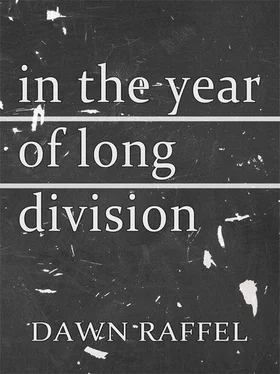“That boy was no account of yours,” the man told her. “Don’t fill your head. That boy was thick. That boy most likely must have jumped.”
The widow squatted down to gunwale level. No, she said, no. She had eyes. She was not so thick herself or dim or gray as all that. So he could save his p’s and j’s, she said, whatever else, excuses, rancid wet birch lunch, strokes. She had her sturdy canvas shoes. She had a widow’s intuition, cash. No more questions needed, please, she said. It was decided.
“Can’t,” the man said.
“Can’t?” the widow said.
The man was doing something with the nails of his fingers.
She stood.
“Can’t get to there by overland alone,” the man said.
There was a sound the widow heard and could not place. There was wetness in the bends of her elbows, a low-boiled feeling deep between her breasts. “And what about the burden of portage?” she said.
“Justice,” the man said. “Blind.”
Then she would steer, the widow said. No questions, please, or boyish sciences of his of navigation. No sir, the widow said. It was decided.
BY talk? he said. By chance? he said. By devil double-daring? Would she holler them across? the man said. Take it sheer will or miss? the widow thought she heard him say. By echo, did he say? Had he said echo?
THE river’s hue was something rare, the widow saw. It was the riverish hue of each rare, raging thing and thing’s shadow, each shadowy submergence rising up against the boat. Dark under-paddle Peshtigo, the widow saw, was flush, ored, flushing under her and minerally lit against a widow’s washy stroke. No dumb rush, this, the widow saw, no passive mincing brook; this was mineral intelligence, a sparkle like a smart glint of eye, a knower’s wink she would as soon have not seen. This was mettle, ire, an unmined bed of metal husbandry below the widow’s body. She rocked; she listed; she listened to the rap against the birch, against the rocks, the rapid rising sluice, the rising Peshtigo a hard hue and scratch against a parched-white side, against a hull, against a widow’s nettled passage. The man was a foment of foamish motion up in front. He was a mannish birchy sound from a direction she did not wish to steer to, to hear from — down, a wraparound of blind-dark curve of rapid dark, dark as unbroken day and sucking dark orish rush, a dark crack against a dumb cut of stump, a stand of reed, ragged edges of the overhangs of sere-dark shore, red knolls and rottish woods, soft, swelled, the opened second-sighted flesh of a boy, the mudded dell, the swaddled shores of Mother Leary’s shedded unlanterned dark. Leery O’Leary of the unquenched flame, of flamish lullabye and Peshtigoish bedtime tale, the boat a cradle in the rocks, unbound, a cradled falling, falling. The corded flesh was singing. The widow was puckered and crooked and raw — dark Peshtigo an unseasoned salt against the skin, whetting, sharp, a liquored lick, a trickle tunneling the breasts and chastened narrows of the legs, a puddled hold of natatorial intelligence as yet not plumbed, a dampened sun, a watered absence sunk beneath a widow’s loose and tendered flesh. She was soaked, drenched, drained. Undrunk. She was widowed. She did not wish to rest. She did not want to speak. She did not want to see to concede to the man, to the boat that she was night-blind lost, that she was going near to gone.
THE Peshtigo was quick.
WAS she watching at all? the man wanted to know. The Peshtigo was not the Kinnickinnic, he said. Was she carrying a grudge?
“Nicolet,” the widow said.
Would she look? the man said. Pay attention to the river? Was she even half-trying to steer, to hold to course?
Need he ask? She could not even swim, the widow said, much less, and neither could he — boyish missing Nicolet, the widow said, and, in fact, she did not wish to start.
“Please,” the man said. “Not now.”
She could see that he was doing something scraping, some scrapey-sounding thing along a rib of the boat.
“And what of the wife?” the widow said.
“Port,” the man said.
This was important.
“Did Nicolet leave a wife?” the widow said. “Was there one, a water widow? And you?” the widow said. The man’s shirt, she saw, was wetted clear to glistening in back.
Was she deaf? the man said. Could she follow a simple direction?
Listen. What she was, the widow said, was sore. Her elbows were achy, her knuckles, palms. They were not even French, the widow said. Nor Sioux. So she was following a hunch and going starboard.
The man had turned to partway face her, but nothing fine was showing in the black of an eye.
“Furry traders,” she said.
“Not here,” the man said.
“Not even Chippewa,” the widow said. “Dunked.” But it was harder than not by now to hear him. Did he say rock? Did he say just? Did he say paddle to port? Did she know where she was going, did he say? The widow felt a hewing up beneath her and through her, a succumbing coming up, and the heat of something not completely fathomed. “Father,” she said.
Was she crazy? she heard. Rock, hull, she thought she heard, straight. But she was pressing through a history herself and said Marquette. They were not even Irish. Oh Joliet, she tried to say, oh Father — to hear how the sound of her voice was dissolving, melting, crazed. Fire-watered traitors, the widow tried to utter and could not — not quite. Shewano, Oconto, De Pere, the widow tried. Wauwatosa. Was he shouting, the man, at her? It seemed he was, for he was, after all, a man of his time, another time, another region. Was it Germantown? the widow tried to wonder. The city of Portage? Eau Claire? The man’s mouth was of the river, of the Peshtigo — the legend undertold. The widow’s tongue tip tinned. Sheboygan, Superior, the widow tried to say as something in her sight began to cant. She was tilting to an unsung place — to a Peshtigoan dairyland delivered up to flame, a leak of history, a snuffing. O’Leary — this coincidence of consequential loss — Oh Prairie du Chien, she might have whispered. Did Chicago burn as willingly, as well? The widow was rushing through a sibilance of grace, through winded cities — bitter red, ash, bitter, bitter river, bitter shore. She was flicking off retention. Was there fire in the unblooded web of flesh and loin, a bone of knowing? Was there wedding of the elements? Did bottom-living minerals anneal?
This is second-guessing.
For a time, the empty boat would be a telling in itself, the man another christened vessel. And the widow? Oh widow — she would not not be counted. She would get to there, if only by the broken skin of dreams. For she’d conceived a destination such as this — to be found, to be found not wanting in the current, in the peril, in the rapture of a stream.
“RINSE it,” said the woman whose guest she was, whose house this was, whose clothes she wore. “My advice,” the woman said, “no salve.”
The woman’s name was Vera, and some last name — the consonants queerly resistant to tongue and to teeth.
“Awful,” Vera said.
“Greasy,” Vera said.
“Rita,” Vera said, “I honestly wouldn’t.”
The faucet was on; the water was coming out hard. What Vera was telling her not to do—“No really, listen, Rita not”—was difficult for her to tell. The water made the wound look more pronounced. Not pink, not red, not even scarlet, no color Rita knew of.
“As if,” Vera said, “you were trying to do yourself in.”
Rita blotted herself with a cloth belonging to Vera, to Vera’s spotless kitchen.
Something was pulsing.
“What is it?” Rita said.
“Whatever they’ve got on,” Vera said. “Some band of his on tape.”
Читать дальше












